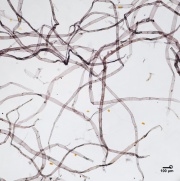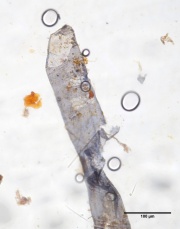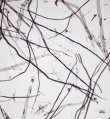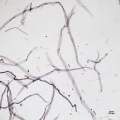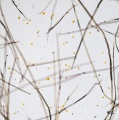Difference between revisions of "Sulfite process"
m (Text replace - "== Authority ==" to "== Sources Checked for Data in Record ==") |
|||
| (4 intermediate revisions by the same user not shown) | |||
| Line 1: | Line 1: | ||
| − | [[File:SWBS puget 10x label.jpg|thumb|Softwood bleached sulfite fibers stained with Graff "C" Stain]] | + | [[File:SWBS puget 10x label.jpg|thumb|Softwood bleached sulfite fibers stained with Graff "C" Stain at 10x]] |
== Description == | == Description == | ||
| + | [[File:HWsulfite 40x.jpg|thumb|Hardwood sulfite pulp stained with Graff "C" stain at 40x]] | ||
A chemical method of producing paper pulp from wood using high heat and [[sulfur dioxide]]. The sulfite process was first patented in 1867, but not in wide use until improvements were made in the 1870s-1880s. To produce pulp, wood chips are cooked in a solution of sulfur dioxide dissolved in an alkaline solution (typically a calcium base). The cooking or steaming process produces bisulfite and then monosulfite, which dissolve lignin and hemicellulose. This method produces a bleachable pulp with a high yield, low cost, and high brightness. However, only limited wood species can be used and the waste recovery system is not as environmentally friendly as other methods. [[Softwood]] species such as [[spruce]], [[balsam fir]], [[western hemlock]] are commonly used. This process is not appropriate for dense [[hardwood]]s, but can be used for [[poplar]] and [[birch]]. The sulfite process can produce high quality pulps, particularly when bleached. Since improvements to the [[kraft process]] in the 1930s, the sulfite process has decreased in popularity. Since 1990, sulfite pulps account for less than 10% of production in the US. | A chemical method of producing paper pulp from wood using high heat and [[sulfur dioxide]]. The sulfite process was first patented in 1867, but not in wide use until improvements were made in the 1870s-1880s. To produce pulp, wood chips are cooked in a solution of sulfur dioxide dissolved in an alkaline solution (typically a calcium base). The cooking or steaming process produces bisulfite and then monosulfite, which dissolve lignin and hemicellulose. This method produces a bleachable pulp with a high yield, low cost, and high brightness. However, only limited wood species can be used and the waste recovery system is not as environmentally friendly as other methods. [[Softwood]] species such as [[spruce]], [[balsam fir]], [[western hemlock]] are commonly used. This process is not appropriate for dense [[hardwood]]s, but can be used for [[poplar]] and [[birch]]. The sulfite process can produce high quality pulps, particularly when bleached. Since improvements to the [[kraft process]] in the 1930s, the sulfite process has decreased in popularity. Since 1990, sulfite pulps account for less than 10% of production in the US. | ||
| Line 6: | Line 7: | ||
Sulfite pulp; sulfite pulping; softwood bleached sulfite; softwood sulfite; hardwood bleached sulfite; hardwood sulfite | Sulfite pulp; sulfite pulping; softwood bleached sulfite; softwood sulfite; hardwood bleached sulfite; hardwood sulfite | ||
| − | == | + | == Physical and Chemical Properties == |
When stained with [[Graff "C" stain]], sulfite pulp can appear in a range of colors depending on the wood type (softwood or hardwood) and the amount of bleaching. Unbleached sulfite pulps will appear yellow or grey. With increased bleaching, pulps will appear lighter and tend more toward red or purple when treated with stain. The stained color of sulfite pulp tends to be lighter than [[kraft process|kraft]] pulp. | When stained with [[Graff "C" stain]], sulfite pulp can appear in a range of colors depending on the wood type (softwood or hardwood) and the amount of bleaching. Unbleached sulfite pulps will appear yellow or grey. With increased bleaching, pulps will appear lighter and tend more toward red or purple when treated with stain. The stained color of sulfite pulp tends to be lighter than [[kraft process|kraft]] pulp. | ||
==Additional Images== | ==Additional Images== | ||
<gallery> | <gallery> | ||
| − | + | Larch 10x.jpg|Softwood (larch) sulfite pulp stained with Graff "C" stain at 10x | |
| − | Larch 10x.jpg|Softwood sulfite pulp stained with Graff "C" stain | + | W red cedar 10x.jpg|Softwood (Red cedar) sulfite pulp stained with Graff "C" stain at 10x |
| − | W red cedar 10x.jpg|Softwood sulfite pulp stained with Graff "C" stain | + | Spruce 10x.jpg|Softwood (Spruce) sulfite pulp stained with Graff "C" stain at 10x |
| − | Spruce 10x.jpg|Softwood sulfite pulp stained with Graff "C" stain | ||
</gallery> | </gallery> | ||
| − | == | + | ==Resources and Citations== |
* J.R.G. Bryce.“Sulfite Pulping” and “Alkaline Pulping”. ''Pulp and Paper: Chemistry and Chemical Technology, Volume 1, Edition 3.'' John Wiley & Sons, 1980. James P. Casey Ed. | * J.R.G. Bryce.“Sulfite Pulping” and “Alkaline Pulping”. ''Pulp and Paper: Chemistry and Chemical Technology, Volume 1, Edition 3.'' John Wiley & Sons, 1980. James P. Casey Ed. | ||
| − | |||
* Christopher Biermann. ''Essentials of Pulping and Papermaking''. Academic Press, 1993. | * Christopher Biermann. ''Essentials of Pulping and Papermaking''. Academic Press, 1993. | ||
| − | |||
* J. H. Graff "Color Atlas for Fiber Identification" The Institute of Paper Chemistry, Appleton, WI, 1940. | * J. H. Graff "Color Atlas for Fiber Identification" The Institute of Paper Chemistry, Appleton, WI, 1940. | ||
| − | |||
* Walter Rantanen. "Fiber ID Course." Integrated Paper Services. June 2013. Lecture. | * Walter Rantanen. "Fiber ID Course." Integrated Paper Services. June 2013. Lecture. | ||
| + | *TAPPI Official Standard T401 om-08. ''Fiber analysis of paper and paperboard''. 2008. http://www.tappi.org/Downloads/Test-Methods/UNTITLED-0104T401pdf.aspx | ||
| − | + | [[Category:Materials database]][[Category:MWG]][[Category:Sheet, Cellulose]] | |
Latest revision as of 12:18, 2 October 2024
Description
A chemical method of producing paper pulp from wood using high heat and Sulfur dioxide. The sulfite process was first patented in 1867, but not in wide use until improvements were made in the 1870s-1880s. To produce pulp, wood chips are cooked in a solution of sulfur dioxide dissolved in an alkaline solution (typically a calcium base). The cooking or steaming process produces bisulfite and then monosulfite, which dissolve lignin and hemicellulose. This method produces a bleachable pulp with a high yield, low cost, and high brightness. However, only limited wood species can be used and the waste recovery system is not as environmentally friendly as other methods. Softwood species such as Spruce, Balsam fir, Western hemlock are commonly used. This process is not appropriate for dense hardwoods, but can be used for Poplar and Birch. The sulfite process can produce high quality pulps, particularly when bleached. Since improvements to the Kraft process in the 1930s, the sulfite process has decreased in popularity. Since 1990, sulfite pulps account for less than 10% of production in the US.
Synonyms and Related Terms
Sulfite pulp; sulfite pulping; softwood bleached sulfite; softwood sulfite; hardwood bleached sulfite; hardwood sulfite
Physical and Chemical Properties
When stained with Graff "C" stain, sulfite pulp can appear in a range of colors depending on the wood type (softwood or hardwood) and the amount of bleaching. Unbleached sulfite pulps will appear yellow or grey. With increased bleaching, pulps will appear lighter and tend more toward red or purple when treated with stain. The stained color of sulfite pulp tends to be lighter than kraft pulp.
Additional Images
Resources and Citations
- J.R.G. Bryce.“Sulfite Pulping” and “Alkaline Pulping”. Pulp and Paper: Chemistry and Chemical Technology, Volume 1, Edition 3. John Wiley & Sons, 1980. James P. Casey Ed.
- Christopher Biermann. Essentials of Pulping and Papermaking. Academic Press, 1993.
- J. H. Graff "Color Atlas for Fiber Identification" The Institute of Paper Chemistry, Appleton, WI, 1940.
- Walter Rantanen. "Fiber ID Course." Integrated Paper Services. June 2013. Lecture.
- TAPPI Official Standard T401 om-08. Fiber analysis of paper and paperboard. 2008. http://www.tappi.org/Downloads/Test-Methods/UNTITLED-0104T401pdf.aspx
